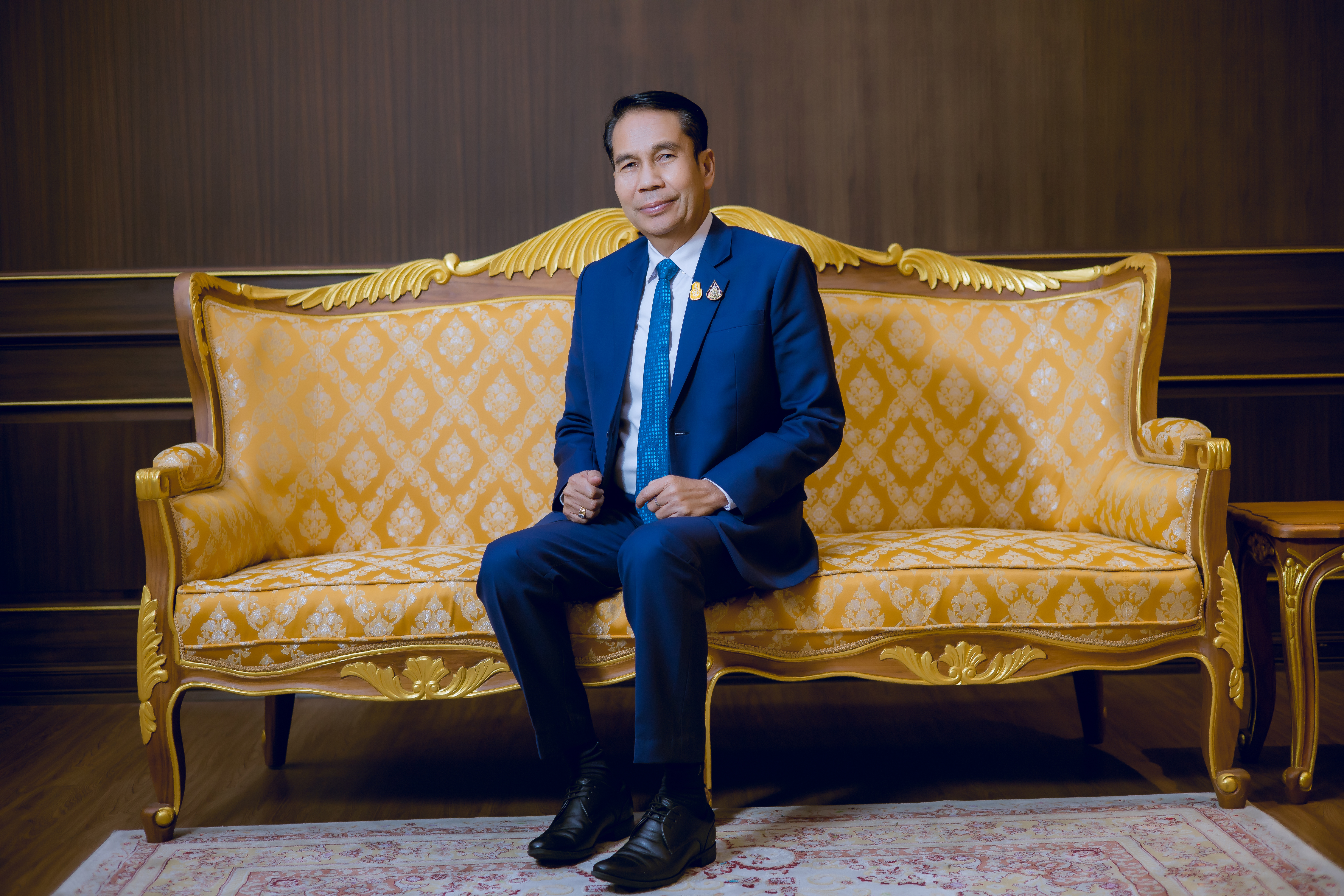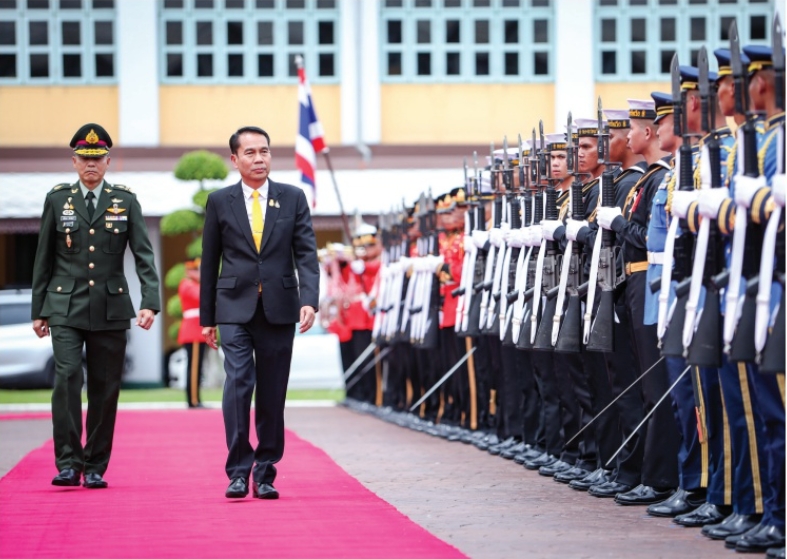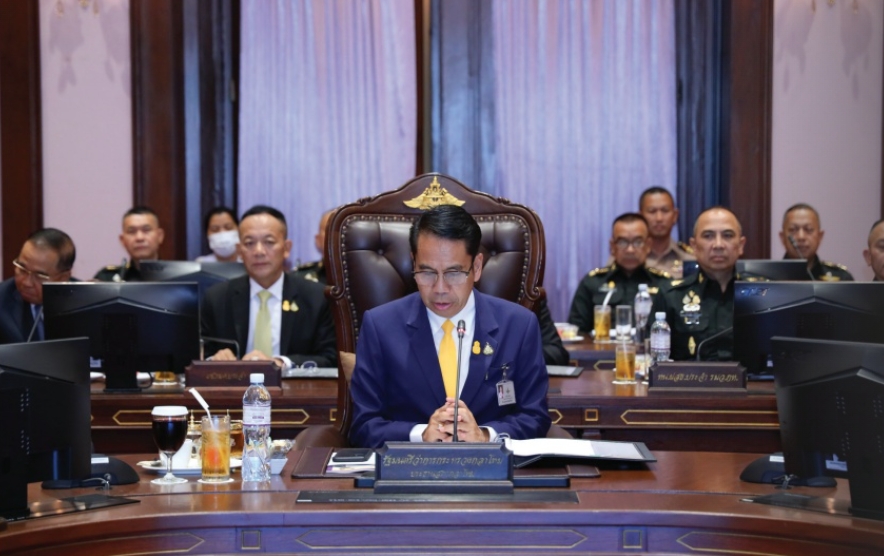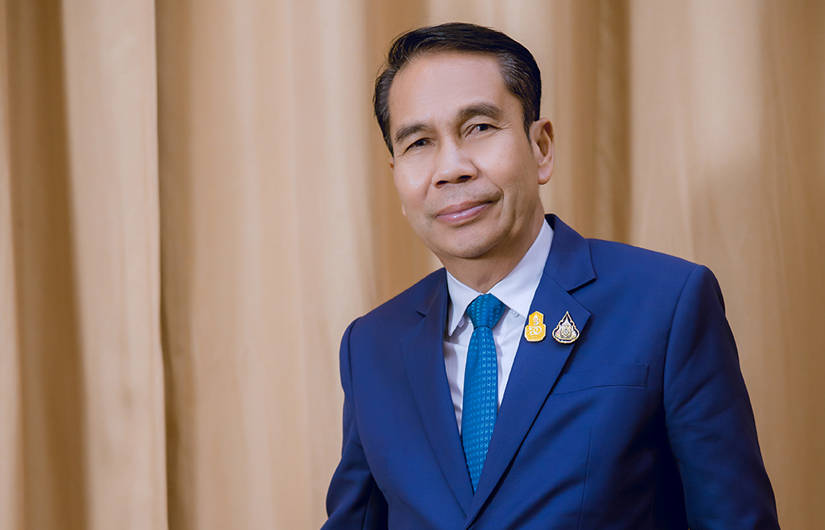Sutin Klungsang is a true Luk Isan, A child of the Northeast, or as he says himself, Dek Nawk, a boy from the provinces. Khun Sutin grew up and was educated in Mahasarakham, where he completed his primary and secondary school studies before enrolling in Srinakharinwirot University, Mahasarakham campus. After graduating with a degree in education he earned a Master’s degree in Thai Studies from Mahasarakham University and then went abroad where he was awarded a PhD from Magadh University in India. For 24 years Khun Sutin worked as an educator before he turned his attention to politics. It is at this point in his life we began our interview as Khun Sutin was very kind to share some of his very precious time with Elite+ magazine.
To begin, can you tell us why you decided to enter politics?
As a teacher, my concerns were social issues, particularly the inequality I saw in society, and thus, economic hardships and improving the quality of life for those around me. This is why I decided to run for Parliament as a Thai-Rak-Thai party-list candidate in 2001 as the party promoted a platform that included helping farmers who had fallen into debt because of the ‘Tom Yam Kung’ financial crisis in 1997. Our Government under the leadership of the former Prime Minister Taksin Shinawatra also introduced the 30-baht universal healthcare scheme to provide all citizens with medical services.
Over the past 20 years, I have served as both a Mahasarakham constituency and party-list Member of Parliament, more recently as a member of the Pheu Thai party, a descendant of Tha-Rak-Thai. During this time, I have served in both the Government and Opposition camps.
I was quite surprised when I was selected for the position of Minister of Defence, but as I have been learning, my concerns are also very important to the Ministry and armed forces as well.
During the previous General Prayut Chan-o-cha administration, you served as the opposition’s Chief Whip and, for a time, you were very active as a leader of the Red Shirts, has this caused any friction since you’ve assumed the post of Minister of Defence?
I have to say I don’t think so. I have consulted many former military commanders, permanent secretaries and ministers to seek their advice, and I have found those at the Ministry and in the different services quite open to my taking the helm. They, like me, think and feel the past is the past and now we must make adjustments so we can work together for the betterment of the military and country.
Since the first of September when I assumed office, I have been studying the ministry and its operations. I am well versed in finances and accounting and so have been examining the books and learning how our budget is being spent, what we need to invest in, and that’s not just equipment, but also training, education and technology, as well as the many social services we perform. What I also now realise is we must modernise the military’s internal culture while improving our relations with the public, which means developing our communications and becoming much more cyber and social media savvy.

Could you expand on this please?
I’m hoping to institute a policy that promotes the many functions of the armed forces, not just defence. Yes, of course, we must always be prepared to defend our sovereignty, but our military does much more than this when it comes to economic development and cultural preservation. We still have much untapped potential that can be developed to expand and raise the quality of our programmes and activities, and we need, as I said earlier, to inform the public as there is much we do that they don’t know.
For example, many people don’t know that we have opened our hospitals and health services to the public, and, in many places, the local citizenry are taking advantage and using our facilities and services even more than our military and their families such as at Phramongkutklao Hospital in Dusit, Bangkok, and the Fort Suranari Hospital in Nakhon Ratchasima. Now, with the flooding in the north of Thailand, I have assigned medical units to go there to assist the people.
How are the Ministry and military working to inform the public about what you are doing?
As you know we have the Channel 5 TV station and a network of radio stations at our different forts and camps located across the country. We are also using social media, but are still quite weak in this area of digital communications. This is an area I know we have to improve in and are already consulting with experts to help develop the skills and knowhow of our personnel. At the same time, we are seeking the advice of public relations experts to help us develop an overall communications plan to better inform the public as well as the members of our armed forces on what we are doing and planning. This is quite important as we prepare to reduce and then end our draft conscription and become a volunteer armed forces.

Next, we would like to ask about military diplomacy and the continuing unrest in the four southern provinces as well as along the Thai borders, especially now with Myanmar.
First of all, the Ministry assigns defence, or military attachés to most of our embassies to develop close and cordial relations with the armed forces in the countries where they are posted. They work to arrange joint training, like Cobra Gold with the US or Falcon Strike with China. At the same time, they are there to assist and advise our ambassadors on military matters.
As you know, the unrest in the four southern provinces is an ongoing concern, but we are working to improve conditions and bring peace to the region. We have programmes to assist the local populace such as the Women Army Rangers, or Female Volunteer Defence Corps, Thaharn Phran Ying in Thai, who assist in border surveillance and work with Muslim female victims as well as offenders. They are also helping in vocational training so local women can earn supplementary income as economic development is so important to reduce tensions.
As I understand it, trade along the Thai-Malaysian border increased by 30% to over 627 billion baht, or slightly more than USD 17 billion, with the reopening of the nine border crossings, and we want to see this continue to grow to help improve the lives of those living in the southern region.
Now, when it comes to the border between Thailand and Myanmar, first you have to remember that it runs for nearly 2,500 kilometres from south to north. At the moment, we have had to deal with incursions by both the Myanmar military and the National Unity and ethnic opposition forces as well as artillery shells landing in our territory and sometimes harming local villagers and their property. In many of these cases, the local Thai commanders must try solve these problems at their roots. Meanwhile, trade along this border in total amounts to nearly 200 billion baht, or USD 5 billion, which is no small figure. There are many who depend on this trade and so the military must ensure there is no conflict at the border crossings, like the Myawaddy-Mae Sot crossing in Tak, that accounts for nearly half of all the trade.

Recently, the Prime Minister paid a visit to Phnom Penh, do you know if the Khao Phra Viharn dispute or the defrauding phone scamming was discussed, and as this has been a problem along the border, is this a Royal Thai Police or Thai military concern?
To be honest, I don’t really know what the two prime ministers discussed as I haven’t yet talked to Prime Minister Srettha. But, right now, the border is peaceful. Still, both we and Cambodia have troops assigned to the border, and we hope after 15 years, access to the ruins will once more be possible from the Thai side in Sisaket, but I cannot tell you when. As far as the scamming operations along the border such as these criminals using Thai mobile signals, I still don’t know who has jurisdiction, but it could be the Border Police. I just can’t say.
Can we return to your plans for what you call co-development and the transition from a conscription to volunteer armed forces?
To begin, you must understand that this will be a long-term process. First we need to make an in-depth study and analysis to determine how best to proceed. I know we will need to develop new curricula for our academies as well as for universities, vocational colleges and secondary schools as well as for our serving personnel, and these can include online, continuing education.
Everyone must learn to understand that, like I said earlier, the military is much more than just a fighting force to defend our country, though this will remain one of our priorities. However, we need to educate our cadets and personnel that the military is here to serve the people and not directly engage in politics.
As you know I am the first civilian who is not also the prime minister to serve as the Minister of Defence. Mostly, they have been former career officers. Thus, we can think of as a starting point in this process of transformation.
If we are going to become a volunteer armed forces, we need to determine selling points that will attract recruits. We need to offer training and opportunities that can help our volunteers develop new skills and knowhow so they can advance if they decide to make the military a career or return to civilian life with the capabilities to find a good job and earn a good income.
I have seen and learned that most of those who are drafted, during their two years of service, do mature and become better individuals who can contribute to our economic and social development. Many of these young men who come into the service are hooligans and have no direction or plans, but they definitely grow into capable adults from their training and service. This is what I want to build upon.
And, as I said earlier, this is where public relations is so vital. We need to change the way people look at the military. We need to change attitudes and inform both the public and our personnel as to what we are doing for the country and can do for them.
The US military has a very good promotional campaign. Their recruitment has as its message, ‘You can become a hero for your country.’ They also offers many educational opportunities within the services or once a person is discharged, providing financial assistance to further their studies. But, as I said earlier, we need to conduct research and study other volunteer military forces to determine what is best for Thailand’s armed forces and the country and our citizenry.
Do you have any final thoughts you would like to leave with our readers?
As you know I am just at the beginning of my tenure. Our administration has only been in office for a month. Like me, all of the government ministers are still learning about their ministries and what will be required.
While this Ministry is named Defence, we do much more than this. Our duties also comprise economic development, social assistance, technological advancement and education as well as communications and the promotion of Thai culture as a soft power. We need to improve in all these areas so that all our personnel and services can achieve their full potential. We need to continue to modernise and become a force the Thai populace can respect and feel certain they can rely on in their time of need.





















































































































































































































































































































































































































































































































































































































































































































































































































